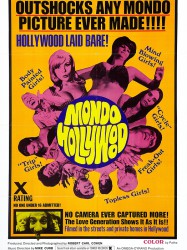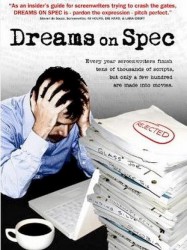I Like Killing Flies est un film de genre Documentaire
I Like Killing Flies (2004)

Si vous aimez ce film, faites-le savoir !
- Infos
- Casting
- Infos techniques
- Photos
- Vidéos
- Passages TV
- Citations
- Personnages
- Musique
- Récompenses
I Like Killing Flies is a 2004 documentary film produced, directed, filmed, and edited by Matt Mahurin. It documents Shopsins restaurant in New York City's Greenwich Village and its owner and head cook, Kenny Shopsin. In 2002 and 2003, Mahurin followed Shopsin in his final year at the location he ran for over 30 years. Throughout the film, Shopsin offers what he calls "half-baked" philosophy, peppered with profanities.
In the first half, Shopsin opens his eatery for the day and talks about his kitchen, his business, his employees, and his customers. We meet the regulars and friends who eat some of the 900 eclectic dishes he prepares, and we learn the rules of the restaurant: all customers must eat, parties of five or more are unwelcome, and anyone who irritates the owner will be swiftly shown the door. Shopsin's wife and children, all of whom work at the restaurant, weigh in on what it's like to work for this eccentric and occasionally hot-tempered man.
In the film's second half, Shopsin loses his lease and is forced to move his establishment to a larger location on nearby Carmine Street. Family, friends, and customers all pitch in to help with the move. Everything must go, from hundreds of knick-knacks and supplies to an alarmingly rickety stove. The reopening is a resounding success. The epilogue grants the audience one last glimpse of Shopsin's life the following year, and it is revealed that Shopsin's wife has died, but he seems not to have changed at all.
Shopsin, who has been profiled in The New Yorker by Calvin Trillin, wrote a 2008 book with Carolynn Carreño entitled Eat Me: The Food and Philosophy of Kenny Shopsin.
Commentaires
Postez un commentaire :
Suggestions de films similaires à I Like Killing Flies
Il y a 8964 ayant les mêmes genres cinématographiques, 997 films qui ont les mêmes thèmes (dont 54 films qui ont les mêmes 2 thèmes que I Like Killing Flies), pour avoir au final 70 suggestions de films similaires.Si vous avez aimé I Like Killing Flies, vous aimerez sûrement les films similaires suivants :

Hollywood (1980)
Réalisé par Kevin Brownlow
Origine Royaume-uni
Genres Documentaire
Thèmes Documentaire sur le monde des affaires, Documentaire sur le cinéma, Documentaire sur les villes
Acteurs James Mason
Note92%





The series consists of thirteen fifty-minute episodes, with each episode dealing with a specific aspect of Hollywood history. The actor James Mason, an enthusiast of the period, supplied the narration; a lilting score was contributed by Carl Davis.

The Czar of Black Hollywood (2014)
, 1h7Origine Etats-Unis
Genres Documentaire
Thèmes Documentaire sur le monde des affaires, Documentaire sur le cinéma, Documentaire sur les villes
Acteurs Oscar Micheaux
Note63%





Oscar Micheaux was America's preeminent black filmmaker for three decades, having directed or produced 22 silent movies and 15 talking pictures. The Czar of Black Hollywood chronicles the real life experiences that inspired Micheaux's films, including the production of the first feature length film, The Homesteader (1919), and sound motion picture, The Exile (1931), by an African-American.

Mondo Hollywood (1967)
, 1h28Origine Etats-Unis
Genres Documentaire
Thèmes Documentaire sur le monde des affaires, Documentaire sur le cinéma, Documentaire sur les villes
Acteurs Rudi Gernreich, Coleman Francis, Frank Zappa, Jayne Mansfield, Alfred Hitchcock
Note60%





 , 10minutes
, 10minutesRéalisé par Ralph Staub
Origine Etats-Unis
Genres Documentaire
Thèmes Documentaire sur le monde des affaires, Documentaire sur le cinéma, Documentaire sur la guerre, Documentaire historique, Documentaire sur les villes, Politique, Documentaire sur la Seconde Guerre mondiale
Acteurs Eddie Albert, Desi Arnaz, Gene Autry, Art Baker, John Carroll, Jackie Cooper
Note51%






Tally Brown, New York (1979)
, 1h37Réalisé par Rosa von Praunheim
Genres Documentaire
Thèmes La musique, Sexualité, La télévision, Homosexualité, Documentaire sur le monde des affaires, Documentaire sur le cinéma, Documentaire sur la musique, Documentaire sur les villes, LGBT, LGBT
Acteurs Holly Woodlawn, Divine, Taylor Mead, Magdalena Montezuma, Rosa von Praunheim, Andy Warhol
Note70%






Dita and the Family Business (2001)
Réalisé par Joshua Taylor
Genres Documentaire
Thèmes La famille, Documentaire sur le monde des affaires, Documentaire sur une personnalité, Documentaire sur les villes
 , 2h15
, 2h15Réalisé par Jack Haley Jr.
Origine Etats-Unis
Genres Documentaire, Musical
Thèmes Film traitant du cinéma, La musique, Documentaire sur le monde des affaires, Documentaire sur le cinéma, Documentaire sur les villes, Musique, Documentaire sur les films
Acteurs Frank Sinatra, Fred Astaire, Bing Crosby, Gene Kelly, Peter Lawford, Liza Minnelli
Note77%





Cette nostalgique leçon d'histoire recèle les trésors cachés des plus grandes comédies musicales de la MGM ainsi que de nombreux autres extraits merveilleux mais moins célèbres, avec Esther Williams, Jimmy Durante, Eleanor Powell et même Clark Gable chantant et dansant. « Il était une fois Hollywood » est une véritable gourmandise pour cinéphiles et amateurs de comédies musicales.

The Miracle of Sound (1940)
, 11minutesOrigine Etats-Unis
Genres Documentaire
Thèmes Documentaire sur le monde des affaires, Documentaire sur le cinéma, Documentaire sur les villes
Acteurs Jeanette MacDonald, Nelson Eddy, Clark Gable, Greer Garson, W. S. Van Dyke, Hedy Lamarr
Note55%





The film starts with a brief introduction to the work of Thomas A. Edison and a clip from William K.L. Dickson's Dickson Experimental Sound Film (c. 1894). Douglas Shearer then presents a behind the scenes look at the filming of W.S. Van Dyke's Bitter Sweet (1940) featuring Jeanette MacDonald and Nelson Eddy to explain how the sound is recorded. A scene from King Vidor's Comrade X (1940) featuring Clark Gable and Hedy Lamarr is used to demonstrate the final result. The film concludes with a montage from trailers for coming MGM pictures and a Technicolor screen test of Greer Garson for Mervyn LeRoy's Blossoms in the Dust (1941).

Dreams on Spec (2007)
, 1h26Origine Etats-Unis
Genres Documentaire
Thèmes Film sur un écrivain, Documentaire sur le monde des affaires, Documentaire sur le cinéma, Documentaire sur les villes
Acteurs James L. Brooks, Nora Ephron, Carrie Fisher, Gary Ross, Steven E. de Souza, Scott Alexander
Note62%





The film follows three aspiring screenwriters as they struggle to turn their scripts into movies. David is a hip talent agent's assistant with three scripts circulating around town. He's plugged into "young Hollywood" - and when he's not working or writing, he's usually hanging out at the beach. Joe is a middle-aged family man who has split time over the last three years between caring for his autistic daughter and writing what he believes could be the great American screenplay. And Deborah is trying to become one of the few African-American women to ever write and direct a feature film, though she's struggling just to pay her bills while she searches for money to produce her script. Between these stories, the film intercuts critical insight from such Hollywood screenwriters as James L. Brooks, Nora Ephron, Carrie Fisher, Gary Ross, Steven E. de Souza, Ed Solomon, Paul Guay, Scott Alexander and Larry Karaszewski.
 , 1h37
, 1h37Origine Etats-Unis
Genres Documentaire
Thèmes Documentaire sur le monde des affaires, Documentaire sur l'art, Documentaire sur le cinéma, Documentaire sur les villes
Acteurs Drew Struzan, Harrison Ford, Guillermo del Toro, George Lucas, Michael J. Fox, Frank Darabont
Note73%





The documentary features interviews with a number of people, including Struzan himself, his wife, Dylan Struzan, his son, Christian Struzan, directors Steven Spielberg, Guillermo del Toro and George Lucas, and actors Harrison Ford and Michael J. Fox. The film follows Struzan's career painting movie posters for films such as Star Wars, The Thing, Back to the Future, the Indiana Jones franchise, and the Harry Potter franchise.
 Connexion
Connexion